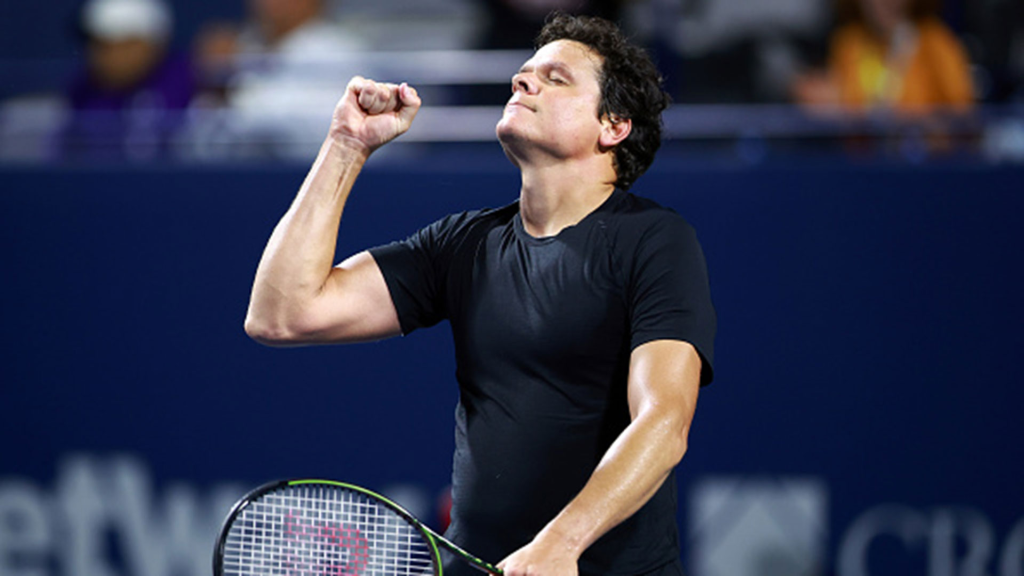
In a dramatic turn of events at the Canadian Open, the tennis world witnessed an intense clash between Milos Raonic and Frances Tiafoe. The fiery match took an unexpected twist when Raonic, overcome by frustration, forcefully smashed his racquet, sparking a contentious debate. The Canadian tennis sensation accused tournament officials of dishonesty regarding a controversial net call against Tiafoe. This incident not only added an explosive moment to the game but also raised questions about sportsmanship and officiating standards.
A Frustration Beyond Bounds
The clash between Raonic and Tiafoe was already laden with tension and excitement, drawing the attention of tennis enthusiasts around the world. The players exhibited remarkable skill and determination, making it a match to remember. However, the pinnacle of the encounter came when Raonic’s frustrations reached a boiling point, leading to an extraordinary and unexpected display of emotion.
The Racquet Smash Heard Around the Stadium
As the match progressed, tensions on the court escalated. Raonic found himself at odds with the officials over a crucial net call. The call, which was contested by both players, became a pivotal moment that ignited Raonic’s emotional outburst. In a fit of anger and disbelief, Raonic smashed his racquet against the court, leaving the crowd in awe and disbelief.
The sight of a shattered racquet and the echoes of its impact resonated through the stadium, serving as a testament to the intensity of the moment. Raonic’s explosive reaction not only encapsulated his frustration but also etched a vivid image in the minds of spectators.
Accusations and Controversy
Raonic’s actions were not limited to the racquet smash; they were accompanied by pointed accusations aimed at the tournament officials. The Canadian tennis star expressed his belief that the net call had been mishandled and that the officials had been untruthful in their assessment. This accusation injected an air of controversy into the match, as it raised doubts about the integrity of the officiating.
A Divisive Debate
In the aftermath of Raonic’s outburst, the tennis community found itself divided. Some empathized with the player’s emotional response, citing the high-stakes nature of professional sports and the pressure that athletes face. They argued that such displays of emotion are an inherent part of the game, reflecting the players’ passion and dedication.
On the other hand, critics contended that Raonic’s actions were unacceptable and tarnished the spirit of sportsmanship. They emphasized the importance of maintaining composure, even in the face of challenging circumstances, and highlighted the impact that such behavior can have on younger fans and aspiring athletes.
The Impact on Sportsmanship
The incident between Raonic and Tiafoe raises important questions about the role of sportsmanship in professional tennis. Sportsmanship is not only a reflection of a player’s character but also a fundamental aspect of the sport itself. It encompasses respect for opponents, officials, and the game itself. While emotions can run high in the heat of competition, maintaining decorum and composure is essential to preserving the integrity of tennis.
The Role of Officiating Standards
The controversy surrounding the net call and Raonic’s accusations highlights the critical role that officiating standards play in professional tennis. Tennis officials are tasked with making split-second decisions that can greatly influence the outcome of a match. As such, it is imperative that these decisions are made impartially and accurately to ensure fairness and maintain the credibility of the sport.
A Call for Transparency
Raonic’s accusations underscore the need for transparency and effective communication between players, officials, and tournament organizers. In order to address instances of disagreement and controversy, it is essential that there is a clear and open channel for dialogue. This can help prevent misunderstandings and foster an environment of trust and fairness.
Lessons for the Future
The incident involving Raonic and Tiafoe serves as a valuable lesson for both players and officials. For players, it highlights the importance of managing emotions and frustration, even in high-stress situations. For officials, it emphasizes the significance of consistent and transparent decision-making.
Furthermore, the incident prompts a broader conversation about the mental and emotional well-being of athletes. The pressures of professional sports can take a toll on players, and finding healthy outlets for emotions is crucial for both performance and personal well-being.
Conclusion
The clash between Milos Raonic and Frances Tiafoe at the Canadian Open will be remembered not only for the intense competition but also for the explosive display of frustration that unfolded on the court. Raonic’s racquet smash and subsequent accusations against tournament officials added a layer of drama and controversy to the match.
While emotions are an integral part of sports, the incident serves as a reminder of the importance of sportsmanship, professionalism, and effective officiating. The tennis world can use this moment as an opportunity to reflect on these values and continue to strive for excellence both on and off the court. As the players and officials move forward, the lessons learned from this incident can contribute to a more transparent, fair, and respectful future for the sport of tennis.


